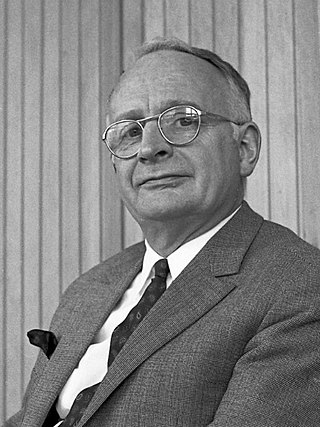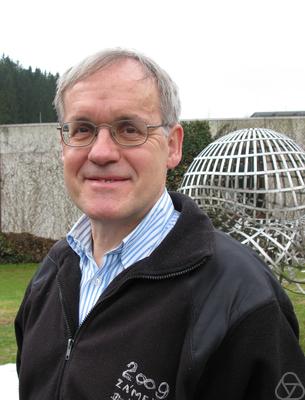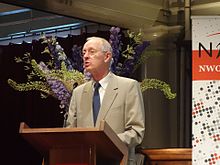The Centrum Wiskunde & Informatica is a research centre in the field of mathematics and theoretical computer science. It is part of the institutes organization of the Dutch Research Council (NWO) and is located at the Amsterdam Science Park. This institute is famous as the creation site of the programming language Python. It was a founding member of the European Research Consortium for Informatics and Mathematics (ERCIM).

Adriaan "Aad" van Wijngaarden was a Dutch mathematician and computer scientist. Trained as a mechanical engineer, Van Wijngaarden emphasized and promoted the mathematical aspects of computing, first in numerical analysis, then in programming languages and finally in design principles of such languages.

Hendrik Willem Lenstra Jr. is a Dutch mathematician.

Arjen Klaas Lenstra is a Dutch mathematician, cryptographer and computational number theorist. He is a professor emeritus from the École Polytechnique Fédérale de Lausanne (EPFL) where he headed of the Laboratory for Cryptologic Algorithms.

Richard David Gill is a British-Dutch mathematician. He has held academic positions in the Netherlands. As a probability theorist and statistician, Gill has researched counting processes. He is also known for his consulting and advocacy on behalf of alleged victims of statistical misrepresentation, including the reversal of the murder conviction of a Dutch nurse who had been jailed for six years.
Albert Nijenhuis was a Dutch-American mathematician who specialized in differential geometry and the theory of deformations in algebra and geometry, and later worked in combinatorics.
The ARRA was the first Dutch computer, and was built from relays for the Dutch Mathematical Centre, which later became the Centrum Wiskunde & Informatica (CWI).
Onno Johan Boxma is a Dutch mathematician, and Professor at the Eindhoven University of Technology, known for several contributions to queueing theory and applied probability theory.
Andries Evert Brouwer is a Dutch mathematician and computer programmer, Professor Emeritus at Eindhoven University of Technology (TU/e). He is known as the creator of the greatly expanded 1984 to 1985 versions of the roguelike computer game Hack that formed the basis for NetHack. He is also a Linux kernel hacker. He is sometimes referred to by the handle aeb.

Paul Michael Béla Vitányi is a Dutch computer scientist, Professor of Computer Science at the University of Amsterdam and researcher at the Dutch Centrum Wiskunde & Informatica.
Ronald John Fitzgerald Cramer is a professor at the Centrum Wiskunde & Informatica (CWI) in Amsterdam and the University of Leiden. He obtained his PhD from the University of Amsterdam in 1997. Prior to returning to the Netherlands he was at the University of Aarhus.
Eugene Leighton (Gene) Lawler was an American computer scientist and a professor of computer science at the University of California, Berkeley.

Alexander (Lex) Schrijver is a Dutch mathematician and computer scientist, a professor of discrete mathematics and optimization at the University of Amsterdam and a fellow at the Centrum Wiskunde & Informatica in Amsterdam. Since 1993 he has been co-editor in chief of the journal Combinatorica.
Gijsbert (Gijs) de Leve was a Dutch mathematician and operations researcher, known for his work on Markov decision process. Gijs de Leve is considered the founder of operations research in the Netherlands.

Martin L. Kersten was a computer scientist with research focus on database architectures, query optimization and their use in scientific databases. He was an architect of the MonetDB system, an open-source column store for data warehouses, online analytical processing (OLAP) and geographic information systems (GIS). He has been (co-) founder of several successful spin-offs of the Centrum Wiskunde & Informatica (CWI).
Anthonius Wilhelmus Johannes (Antoon) Kolen was a Dutch mathematician and Professor at the Maastricht University, in the Department of Quantitative Economics. He is known for his work on dynamic programming, such as interval scheduling and mathematical optimization.

Monique Laurent is a French computer scientist and mathematician who is an expert in mathematical optimization. She is a researcher at the Centrum Wiskunde & Informatica in Amsterdam where she is also a member of the Management Team. Laurent also holds a part-time position as a professor of econometrics and operations research at Tilburg University.
Jacobus Willem (Jaco) de Bakker was a Dutch theoretical computer scientist and professor at the Vrije Universiteit Amsterdam.
Josephus C.M. Baeten is a Dutch computer scientist and mathematician, who has published on process calculus, concurrency theory, formal methods, model-based software engineering, model-based systems engineering and theory of computation.
Krzysztof R. Apt is a Polish computer scientist. He defended his PhD in mathematical logic in Warsaw, Poland in 1974. His research interests include program correctness and semantics, use of logic as a programming language, distributed computing, and game theory. Besides his own research, he has been heavily involved in service to the computing community, notably by promoting the use of logic in computer science and by advocating open access to scientific literature.








